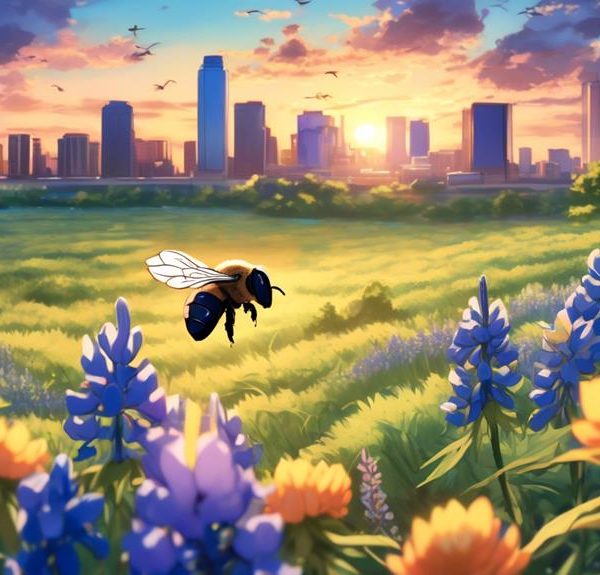Harness your curiosity and unravel the mystery of whether mason bees are friendly or not – the answer might astonish you!
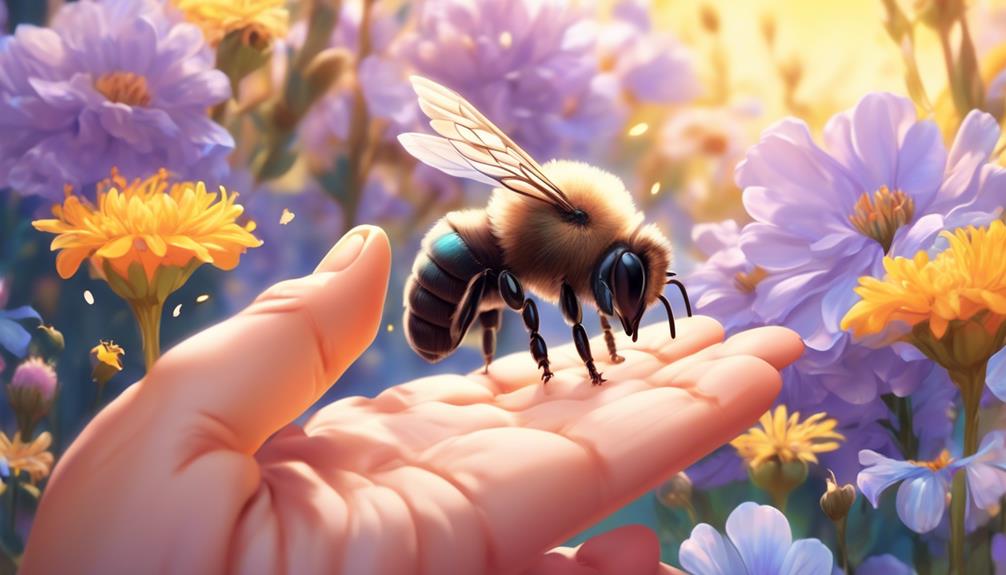
Are Mason Bees Friendly
Like a mystery wrapped in an enigma, the behavior of mason bees can be quite peculiar and intriguing to observe. You might have noticed these tiny, industrious creatures buzzing around your garden or local park, and perhaps you've wondered if they're friendly or not.
Mason bees are a unique species, known for their solitary nature and their penchant for making nests in tiny crevices using mud – hence their name. But does their solitary nature mean they're aggressive, or might they be more friendly than we give them credit for?
Stick around – the answer just might surprise you.
Key Takeaways
- Mason bees are solitary creatures and are not aggressive towards humans.
- They construct their nests using mud and prefer small, dark spaces for nesting.
- Mason bees are efficient pollinators, outperforming honeybees, and carry pollen on their belly.
- Providing mason bees with nesting materials and a pesticide-free environment ensures their survival and benefits gardens and orchards.
Understanding Mason Bees
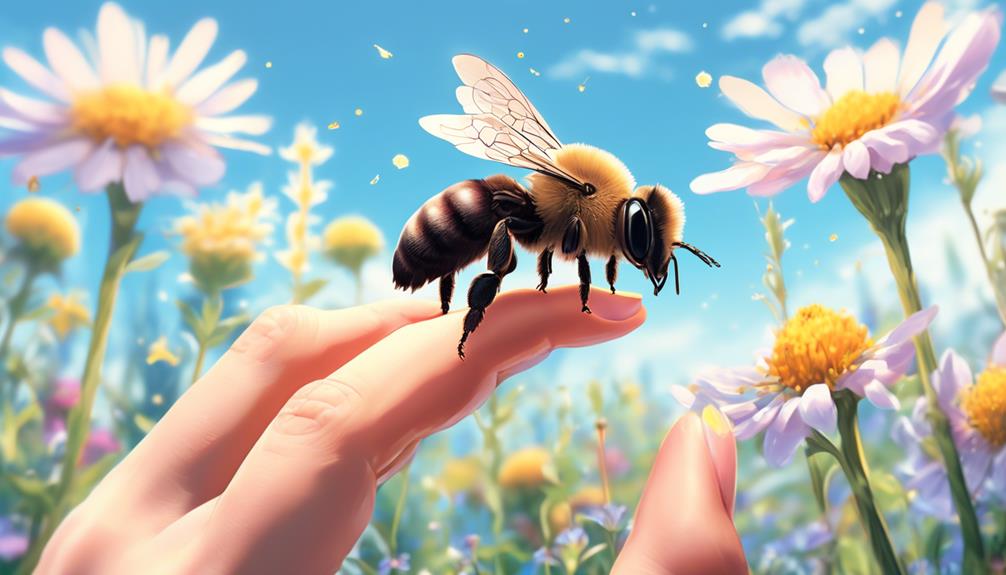
Often misunderstood, mason bees are solitary creatures that play a vital role in the process of pollination. Unlike their hive-dwelling cousins, you won't find mason bees in large swarms. They're introverted, preferring to work alone, each female constructing her own nest. Don't be misled by their solitary nature; they're not hostile. In fact, they're quite harmless to humans, rarely stinging unless threatened.
Mason bees are truly fascinating from a scientific perspective. You see, they're efficient pollinators, far outperforming honeybees. A few hundred mason bees can do the same pollination work as thousands of honeybees. Remarkably, they're able to achieve this because they carry pollen on their belly, where it's more likely to brush off on flowers.
Analyzing their nesting habits reveals another intriguing aspect. They don't build traditional hives. Instead, they use pre-existing holes, often in wood, filling them with a series of mud-walled cells. Each cell contains an egg and food for the larva.
Mason Bees Behaviour Patterns
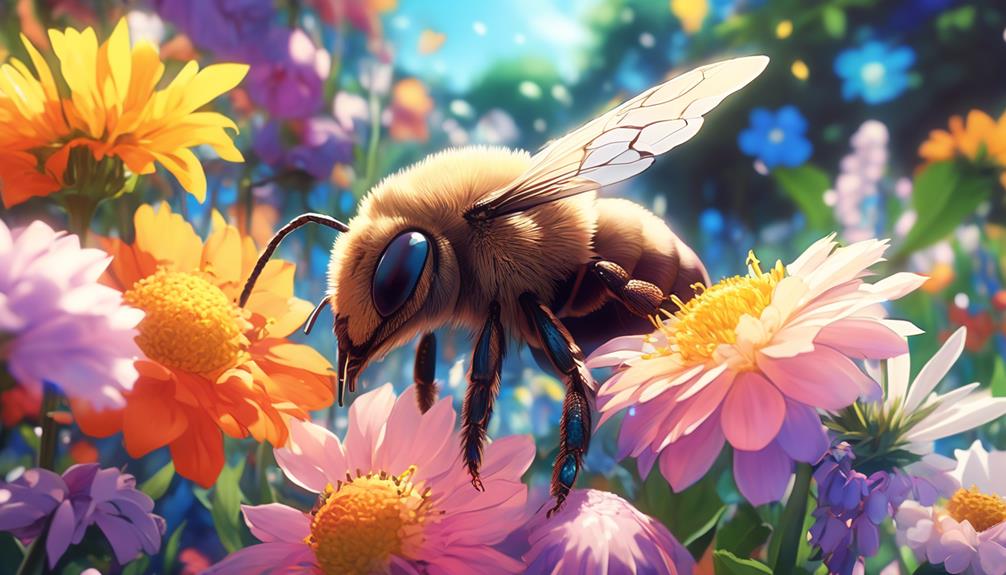
Building on their intriguing nesting habits, let's examine the behavior patterns of mason bees more closely. Unlike many bee species, mason bees are solitary creatures, meaning each female is fertile and makes her own nest. They don't have a queen or a colony to protect, which makes them less aggressive and less likely to sting.
Mason bees are also unique in their foraging habits. They're not picky eaters; they'll visit a variety of flowers, helping to pollinate a diverse range of plants. They're known to be efficient pollinators, often doing a better job than their honeybee counterparts.
You'll notice that mason bees are active in cooler temperatures, often seen in early spring. They've a short lifespan, usually only living for about a month. However, in that month, a female can lay dozens of eggs, ensuring the next generation.
Their nesting habits are particularly fascinating. Mason bees use mud to build their nests, hence their name. They prefer small, dark spaces, often choosing holes in wood or hollow stems. Each egg is sealed in its own mud chamber, providing a safe environment for the developing larvae.
Human Interaction With Mason Bees
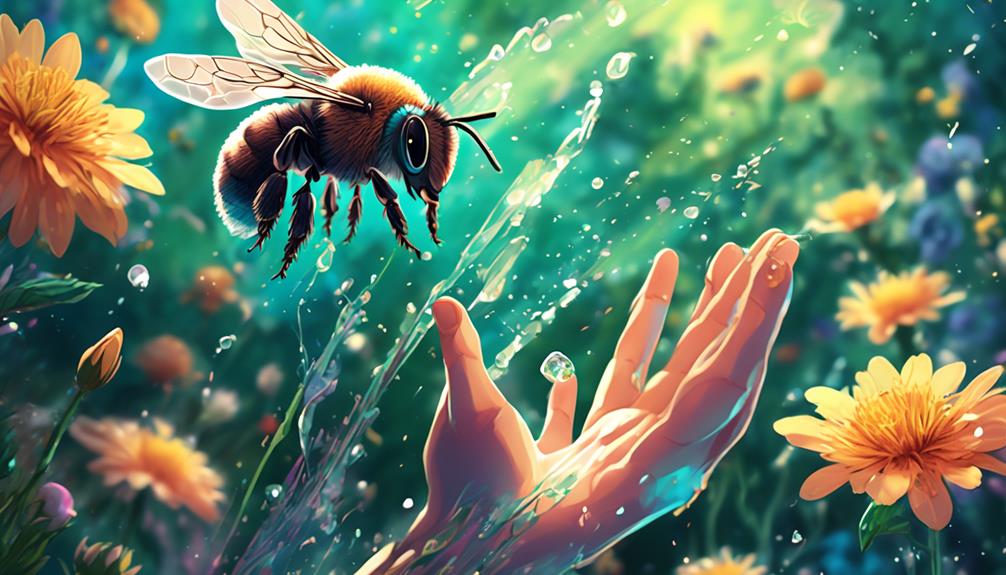
When it comes to interacting with mason bees, you'll find these solitary pollinators to be quite amicable, due to their non-aggressive nature and lack of a hive to defend. Unlike social bees, they've no colony to protect, reducing the likelihood of them stinging unless severely provoked.
You might wonder if their solitary behavior affects their interaction with humans. Interestingly, it doesn't. While they may not engage in cooperative behaviors like honeybees do, mason bees are still quite tolerant of human presence. They're more focused on pollination, not defense.
Moreover, mason bees are beneficial for human environments. They're excellent pollinators, often outperforming their social counterparts. This makes them valuable assets in gardens and orchards, improving crop yield and promoting biodiversity.
However, it's essential to remember that they're wild creatures, not pets. Their needs must be respected. Providing them with adequate nesting materials like hollow stems or pre-made bee houses, and a pesticide-free environment, ensures their survival and prosperity.
Are Mason Bees Aggressive?
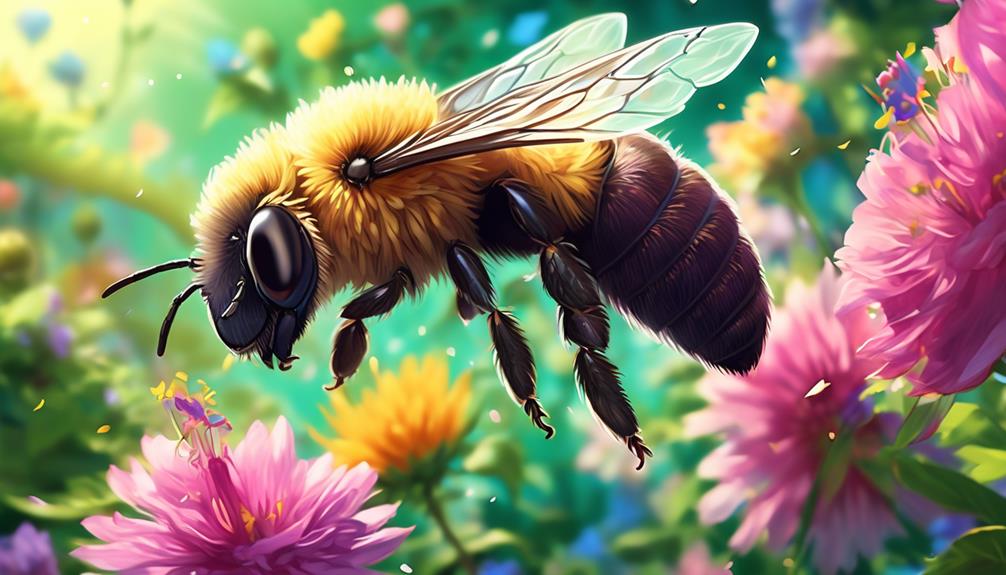
Contrary to popular belief, you'll find mason bees to be incredibly non-aggressive, exhibiting defensive behavior only when they feel threatened or trapped. Unlike honey bees or wasps, mason bees are solitary creatures, meaning they don't have a hive or queen to protect. This drastically reduces their need for aggression.
When you encounter a mason bee, it's more likely to fly away than confront you. They're equipped with stingers but rarely use them. Even in an unlikely instance of a sting, you'll find it to be much less painful than that of a honey bee.
Their docile nature, however, doesn't mean they're pushovers. Mason bees will protect their nests if they perceive a threat. Intruding insects face the brunt of their defense mechanism. Yet, their primary reaction to danger is to retreat rather than attack.
In essence, mason bees aren't naturally aggressive. Their actions lean more towards defensive rather than offensive. Your interactions with them should always be respectful and cautious, not due to a risk of aggression, but to preserve these beneficial pollinators. So, let's dispel the myth of the 'aggressive' mason bee.
Beneficial Aspects of Mason Bees
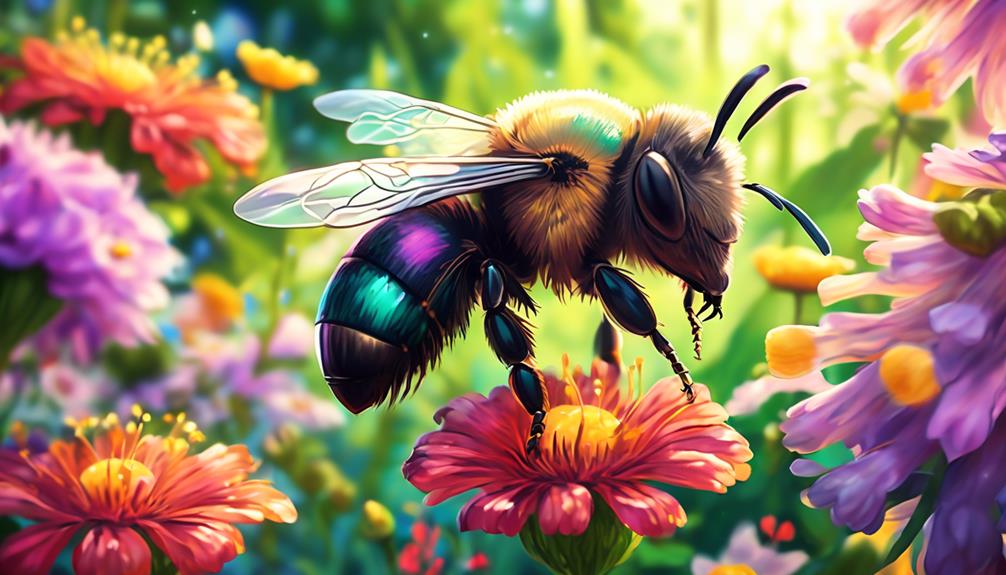
Harnessing their industrious nature, you'll find mason bees to be phenomenal pollinators, playing a crucial role in the ecosystem and agriculture. Unlike honeybees that concentrate on a single type of flower, mason bees are generalists, visiting a wide variety of plants. This increases cross-pollination, fostering plant diversity and resilience.
You can appreciate the efficiency of these bees when you learn that a single mason bee can pollinate as many flowers as 100 honeybees. This superior performance makes them valuable for orchard farmers, particularly those growing apples, cherries, and blueberries. They're early season pollinators and are active in cooler temperatures, ensuring that early blooming crops get the pollination they need.
Moreover, mason bees are non-aggressive and low maintenance, making them ideal for urban gardening. They don't produce honey, so they don't attract pests or require the same level of care as honeybees. They're solitary creatures, preferring to nest in pre-existing holes, often in wooden blocks provided by humans.
Frequently Asked Questions
What Is the Lifespan of a Mason Bee?
You're asking about the lifespan of a mason bee.
Typically, their lifecycle lasts about a year, but most of it's spent in the larval and pupal stages.
The adult stage, when they're active and buzzing around, lasts only for about 4-6 weeks.
They emerge in the spring, mate, and then die after the females have laid their eggs.
It's a short but productive life for these hardworking bees!
Can Mason Bees Sting Humans?
Yes, you can be stung by a mason bee. However, it's important to note that they're typically non-aggressive and only sting when provoked or threatened. Their sting is also much less painful than that of honey bees or wasps. You'd likely only feel a slight pinch.
How Do Mason Bees Contribute to Pollination?
You're asking about Mason bees' role in pollination. They're highly effective pollinators, even more so than honeybees. With their fuzzy bodies, they pick up pollen easily and distribute it to many flowers in a short time.
They're solitary bees, so they're not tied to a hive and can cover a larger area. This means they're helping to pollinate crops and gardens, boosting food production and biodiversity.
They're an important link in our ecosystem.
How to Attract Mason Bees to Your Garden?
You can attract Mason bees to your garden by providing a suitable habitat.
Start by planting native flowers they love, such as fruit trees and spring-blooming plants.
They're also attracted to mud, so ensure there's a patch near their dwelling.
Lastly, set up a bee house with small holes where they can nest.
These steps will make your garden irresistible to these efficient pollinators.
What Are the Threats to Mason Bees in the Wild?
Yes, Mason bees are friendly. They're not aggressive and rarely sting unless trapped or squished. Unlike honeybees, they don't have a hive to protect, so they're less defensive.
They're solitary bees, each female lays her eggs in her own nest. They're also great pollinators, even more efficient than honeybees.
Conclusion
In conclusion, mason bees are friendly, non-aggressive creatures. They display unique behavior patterns, but don't pose a threat to humans.
In fact, they're beneficial insects, playing a vital role in the ecosystem by pollinating plants.
So, if you come across mason bees, there's no need to worry. They're more interested in flowers than humans.
Remember, their presence signifies a healthy environment, so let's appreciate these industrious, harmless little creatures.

